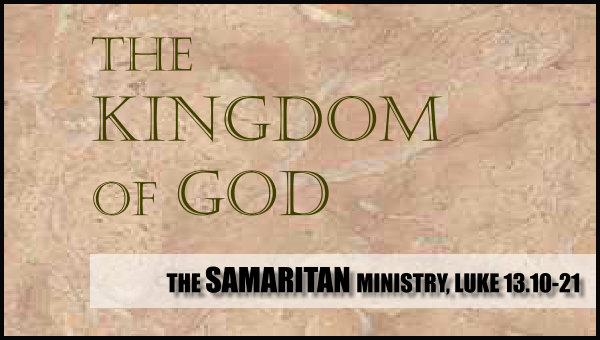By Tyson Thorne

The Samarian Ministry at Various Cities (9.51-18.34), 13.10-21
This passage is the account of the last time Jesus will speak in a synagogue before his death and resurrection. From this point forward he is on a direct route to Jerusalem and the fulfillment of his mission. Luke doesn’t tell us what the sermon was about, but we might be able to guess based on the object lesson. At the end of his talk Jesus had a woman come forward who was suffering from what sounds like a spinal infirmity. Jesus tells us it was caused by an unclean spirit and that she had been under its oppression for 18 years.
Often what people suspect of being a demonic possession is in reality a physical or psychological issue, in this case the opposite is true. This is an example of a possession that mimics physical maladies. This encounter might even had been mistaken for a healing rather than an exorcism, except that Jesus tells us plainly that Satan had bound this woman and caused her condition. This account gives us another peak inside the unseen realm.
We’ve seen possessions where the demons provide the afflicted with inhuman strength (Luke 8), where the demon throws the oppressed to the ground causing convulsions similar to epileptic seizures (Luke 9), some submit easily (Luke 10) and some only come out through prayer and fasting (Mark 9 has this explanation, but the rest of the account in found in Luke 9) and some can cause a person to be mute (Luke 11). Any Christian who denies the existence of demons isn’t paying attention.
What does this have to do with Jesus’ sermon? Maybe nothing; possibly everything. Just as this woman had been crippled by spiritual forces so too Israel had been crippled in her relationship with God. Just as Jesus called this woman to stand upright, so his ministry was to call Israel to lead an upright life in light of the coming Kingdom. In both cases, the physical affliction and the nation’s spiritual despondency, the solution is the same: faith in Jesus. I imagine this was the outline of the day’s sermon.
Of course, no good deed goes unpunished. The synagogue president complained that “healing” was a work, and reminded everyone that no work was to be performed on the Sabbath. Jesus called out the man’s hypocrisy; everyone at least waters their animals on the Sabbath, and surely this woman’s condition was more pressing than livestock. Luke tells us the synagogue leader was humiliated and the people impressed by Jesus’ quick retort.
We mentioned already that it is suspected Jesus’ sermon was on living an upright life in accordance with God’s Kingdom, which was very near. Here is more evidence. After putting the Synagogue president in his place, Jesus asks the crowd a rhetorical question: “What is the Kingdom of God like?” He answers the question with two similes, both of which make the same point.
The first is a comparison of the Kingdom to a mustard seed. The seed itself is only one or two millimeters in size but the tree that grows from it can be as tall as 15 feet in a single season! Similarly, only a little yeast is mixed in with much flour in order for the bread to rise. Normally Jesus uses yeast to illustrate the effects of sin, but here it has a positive use. The point seems clear, however, that the Kingdom of God starts from humble and unassuming origins but blossoms into one’s life, or a community or even a nation very quickly. We see this same kind of thing in Jesus’ teaching on the people of the kingdom, which we’ll look at in detail tomorrow.
|
|
